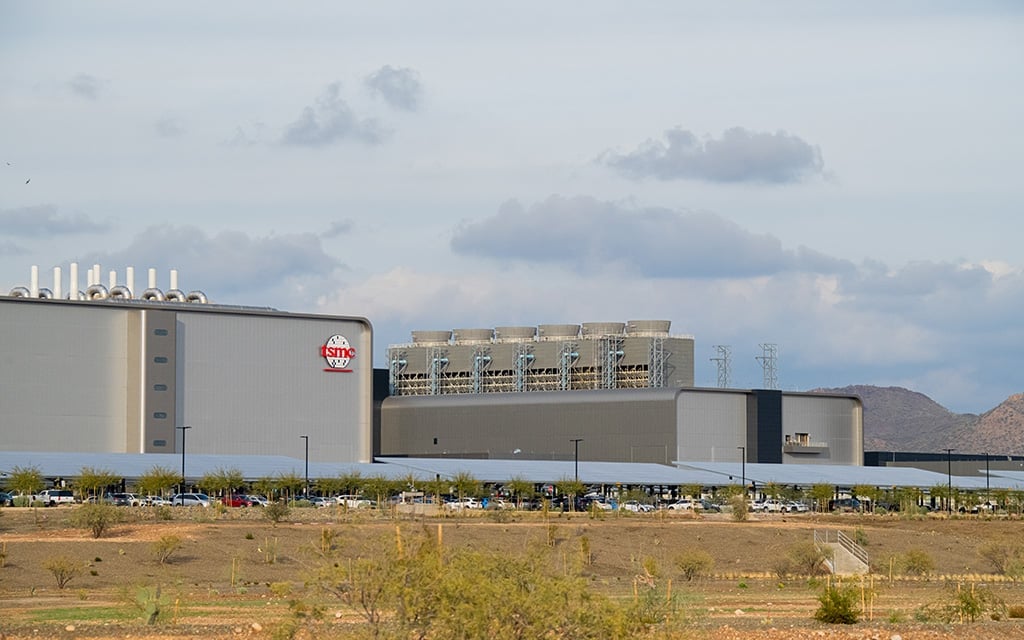
Taiwan Semiconductor Manufacturing Company plans to invest over $65 billion to build three factories in Phoenix. (Photo courtesy of TSMC)
WASHINGTON – The Biden administration has finalized a $6.6 billion award for the Taiwan semiconductor giant that is building massive factories in Phoenix, amid concerns President-elect Donald Trump will derail subsidies aimed at fostering the domestic chip industry.
“This is a gigantic announcement,” Secretary of Commerce Gina Raimundo told reporters on a call ahead of the announcement early Friday, 10 days after Trump’s election.
“This will be one of the most important investments that we make as a country to advance our economic and national security,” she said.
The Taiwan Semiconductor Manufacturing Company plans to invest $65 billion on three state-of-the-art fabrication plants, or fabs, that mean thousands of jobs in Arizona.
Semiconductors are used in chips that make computers work, along with cell phones, fighter jets, self-driving cars, artificial intelligence and even ovens.
U.S. officials alluded to Trump’s election to explain the timing of the award.
“For the next two months, you’ll continue to see Commerce finalizing more awards, ensuring progress made to date will carry forward through the end of the decade,” Lael Brainard, director of the National Economic Council, told reporters Thursday – two months and a week before Trump will be sworn in.
In April, the Biden administration promised $6.6 billion in grants to TSMC to build the Phoenix fabs, plus up to $5 billion in loans. The funds come from one of Biden’s signature legislative achievements, the CHIPS and Science Act, which set aside $52.7 billion for chip research, manufacturing and workforce development in the United States.
TSMC, one of the world’s largest companies, makes chips for leading technology and artificial intelligence developers, including Apple, NVIDIA and AMDl.
In June, Trump rattled investors when he accused Taiwan of stealing the U.S. chip industry and asserted the U.S. shouldn’t be “giving them billions of dollars to build chips.”
“That CHIPS deal is so bad,” he said Oct. 25 on the Joe Rogan podcast.
Last month, House Speaker Mike Johnson, who voted against the CHIPS Act, said he would work to repeal the law if Trump was elected. He quickly backtracked when fellow Republicans reminded him of the jobs on the line in their districts.
TSMC announced the first Arizona fab in May 2020. Production began in April.
Biden signed the CHIPS Act in August 2022. The company announced a second fab in December that year, with production expected to start by 2028. The company announced its third fab in April when Biden announced a preliminary agreement to provide the federal subsidies.
To receive funding under the CHIPS Act, the company must hit certain construction, production and other milestones. TSMC has met enough milestones to receive at least $1 billion by the end of the year, and will receive the rest as the project progresses, said Michael Schmidt, director of the CHIPS program office at the Commerce Department.
“It’s a binding contract,” added Ryan Harper, the White House CHIPS implementation coordinator. “The company, as long as it meets its milestones, has a contractual binding agreement from the government to move forward.”
Early production yields at TSMC’s first fab in Arizona are at least as good as at similar factories in Taiwan, Bloomberg reported last month.
Raimundo called the progress “unbelievable.”
“Even though it has never been done before in the U.S., it’s being done now,” she said. “To all the naysayers, I say: It’s happening. The proof is in the pudding.”
TSMC’s plants in Arizona represent the biggest such foreign investment in U.S. history, the White House said.
In a statement, Biden noted that semiconductors were invented in the United States but only 10% are now made here, and all of the most advanced chips are made overseas.
Once the first TSMC fab is fully operational in a few months, Biden said, “for the first time in decades an American manufacturing plant will be producing the leading-edge chips used in our most advanced technologies.”
